Article 62: Coffee and the Korean aspiration
In just one generation, Korea has transformed itself from one of the world’s poorest countries into an economic powerhouse. The driving force of this change lies in the creative and innovative desire that Koreans always cultivate.
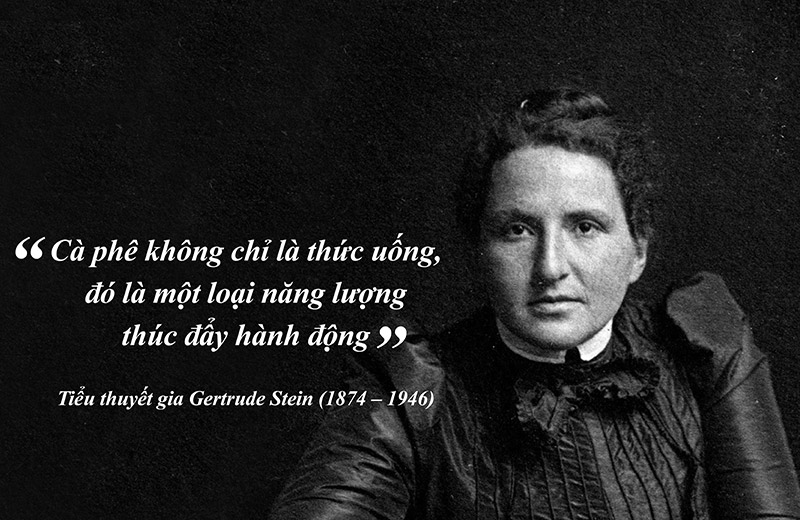
“Coffee is a lot more than just a drink; it’s something happening.” Novelist Gertrude Stein (1874-1946)
Coffee and the imperial dream
The second half of the 19th century to the beginning of the 20th century was the most volatile period in Korean history. Imperialism from Europe spilled over into Asia, bringing with it concepts of civilization that spread among the masses. From here arose concerns about the dream of anti-feudalism and building a modern nation.
King Gojong – the last king of the Joseon Dynasty made an important transformation, bringing Korea from a feudal dynasty to a modern state, calling it the Korean Empire. Gojong became the first emperor and began the reform process, laying the basic foundation for the country’s development later.
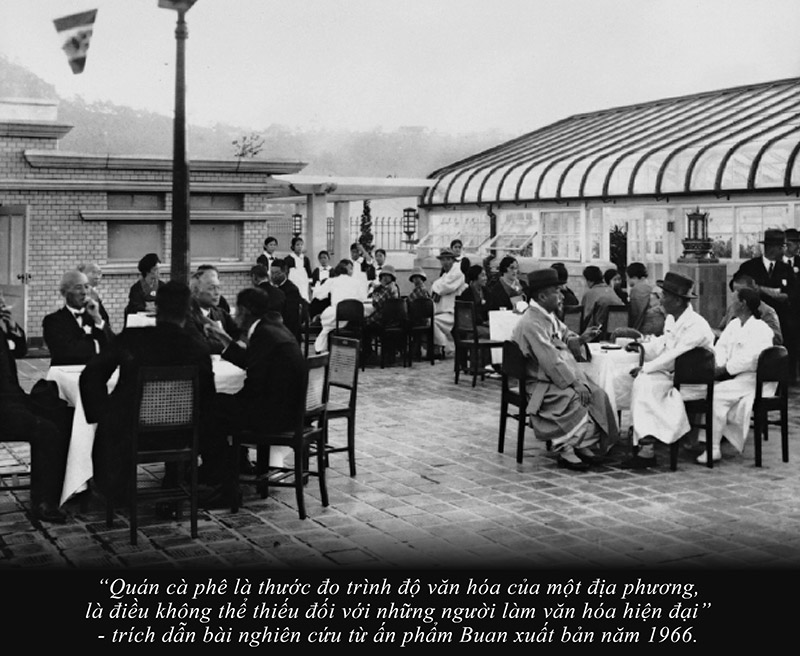
“Coffee shops are a measure of the cultural level of a locality, which is indispensable for modern cultural workers” – quoted research paper from Buan publication published in 1966.
Gojong traveled to America, Europe, Russia and he realized that Korea was lagging behind the rest of the world. Gojong firmly implemented national modernization policies. Under his leadership, for the first time, Korea had a compulsory education policy, with a modern science academy, a book printing house, a patent office, a math center, etc. Gojong also protected the research activities to learn the cultural quintessence of contemporary powers.
In 1882, Korea and the United States signed the Treaty of Peace, Friendship, Commerce and Navigation. This was an important milestone that facilitated the introduction of coffee – a trendy drink in America at that time into the Korean Empire. Emperor Gojong was very fond of this special drink that kept people’s minds awake and ordered coffee to be served in the royal family.
In Deoksugung Palace, Gojong built Seokjojeon building in Western style. This is where Emperor Gojong drank coffee with ministers while discussing national affairs. The Russian Embassy in Korea at that time had a German-born woman named Antoinette Sontag (1845-1925) famous for making delicious coffee and knowledgeable about European culture. She was invited to the royal palace in charge of making private coffee for the royal family. In 1902, Gojong supported Antoinette Sontag to open the first coffee shop in Seoul, Korea. The early type of coffee shop called Dabang was reserved for royalty, politicians, elites and diplomats. British Prime Minister Winston Churchill, novelist Jack London, Mark Twain have all been to this cafe.
In a short time, the cafe became a meeting place for influential figures and pro-reform intellectuals. Sontag cafe played such an important role that it could be considered the diplomatic center of the Korean Empire at that time. The group of Enlighteners aspiring to promote national self-reliance “Jeongdong-gurakbu” operated mainly here. Daehan Maeil Shinbo newspaper, which discusses current social issues in order to enlighten Koreans to better understand the country, was also born at this cafe. Arguably most of the innovation movement was discussed in the Sontag cafe. During the reform years, Korea carried out hundreds of comprehensive modernization projects in the fields of politics and human life. In the early 20th century, the Korean Empire was recognized as a great power in East Asia.
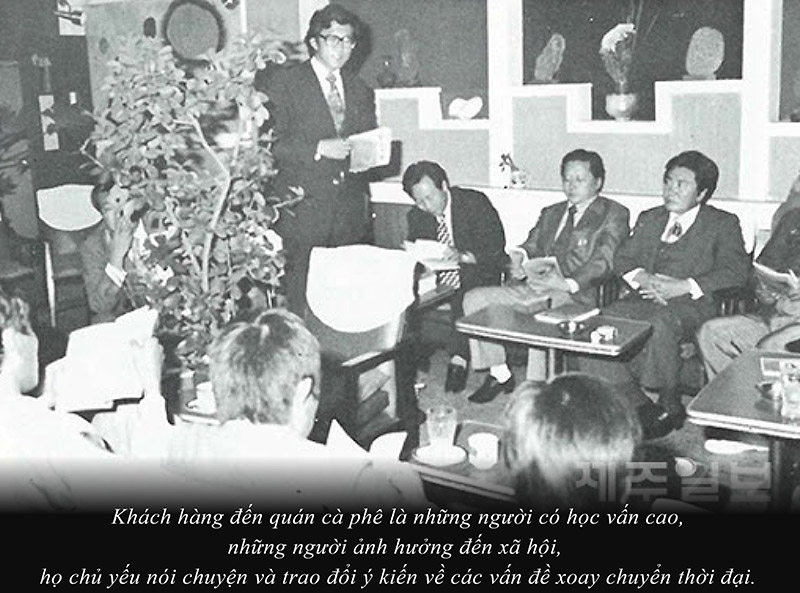
Customers who come to the cafe are highly educated people, social influencers, they mainly talk and exchange opinions on issues that turn the times.
In 1910, Japan occupied Korea, aspiring to assimilate the Koreans. During this period, the patriotic movement developed strongly in the form of cultural movements, with the aim of emphasizing the importance of nurturing and cultivating internal forces in preparation for national independence. The typical feature was the need to affirm the identity – being through the system of symbols and symbolic values as the pillars for the national polity.
Since the Samil Independence movement (the event that catalyzed the establishment of the Provisional Government of the Republic of Korea), coffee shops developed and spread more deeply into Korean social life. In 1927, Korean writers and artists opened a cafe in their own style. The first cafes operated by Koreans such as Kakadu, Jebidabang, Cafe Tsuru used furniture representing modern Korean culture created by Korean painters, photographers, and artisans. The cafe is organized as a space to experience culture and awaken the times, a place to organize art exhibitions, literary discussions and music performances… Genius poet Lee Sang, Lee Kwang-soo, novelist Kim Yoo-jeong, Park Tae-won, painter Koo Bon-woong created most of the works that moved people’s minds at the cafe.
Having endeavored to change, but when World War II ended, Korea fell into a war that divided North-South which caused great damage, turning Korea into one of the poorest countries in the world.
Coffee and the spirit of daring to challenge failure
In the 1950s and 1960s, most Koreans were in poverty, unable to meet the minimum living needs. In the midst of extreme difficulties, the Korean government launched the Saemaul Undong movement, once again awakening Korean aspirations. Korea had a long sleep during the years of colonization and war, the people had to wake up to act together. Natural resources are limited, but human creativity and efforts are limitless, the Saemaul Undong movement calls on Koreans to aspire to “a better life”, to inculcate the spirit of “together we can”.
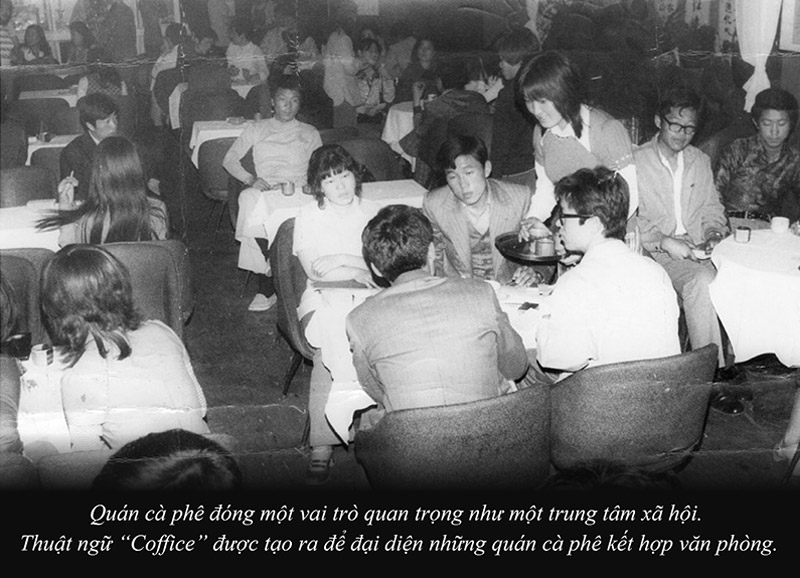
Coffee shops play an important role as a social hub. The term “coffice” was created to represent coffee shops that combine offices.
Essentially, Saemaul Undong focused on immaterial growth, a strategy of creating social change through establishing new lifestyles, transforming community consciousness, and building individual capacities. Koreans understand that, to become a great nation, each individual must think big. When an individual starts-up, there will be a supportive community. People with the will to rise up, with a progressive spirit despite adversity such as Chung Ju-yung (founder of Hyundai Group), Kim Woo-jung (founder of Daewoo Group), Lee Byung-chul (founder of Samsung Group), Koo In Hwoi (founder of LG Group)… were entrusted with the responsibility of shouldering major goals in the national economic development strategy.
People participated in Saemaul Undong through initiatives that contributed to common development projects. It can be said that this is a form of community intellectual synergy, arousing a dynamic and creative life attitude to promote a rapid and comprehensive innovation process for a desirable future.
Coffee shops in this period grew rapidly, in the 1960s – 1970s, Korea had more than 5,000 coffee shops. The cafe space was where creative talents started their big plans. Haklim Tea House cafe located opposite Seoul National University was called “The 25th Lecture Hall” because this was the place to meet and share the research of advanced intellectuals with students. Eagle Tea House cafe in Shinchon, Doksuri Teahouse near Yonsei University was where young people discussed concerns of the times. Galchae Coffee House, Baeknok Coffee House were always filled with magazines and manuscripts of writers and artists. Cafes Dongdong, Obis Cabin in Myeong-dong and Shelbourg in Jongno-gu were where the golden age of musical coffee began.
Entrepreneurs used coffee shops as informal offices when they could not afford to open their own offices. Myeongdabang cafe with modern style was always crowded with business people. Deawon, Woobong, Jim, Byeol cafes were regular workplaces of many Korean business owners in the innovation stage. Even the coffee shop manager acted as a secretary for these entrepreneurs and the so-called “coffee shop companies”. Jongno commercial area was the gathering center of a series of cafes such as Hangaram, Asia, Gyeongseong, Namgung, Shinsa, Kukje, Jeil, Danseongsa… which were commercial spaces for young people who dreamt of starting a business.
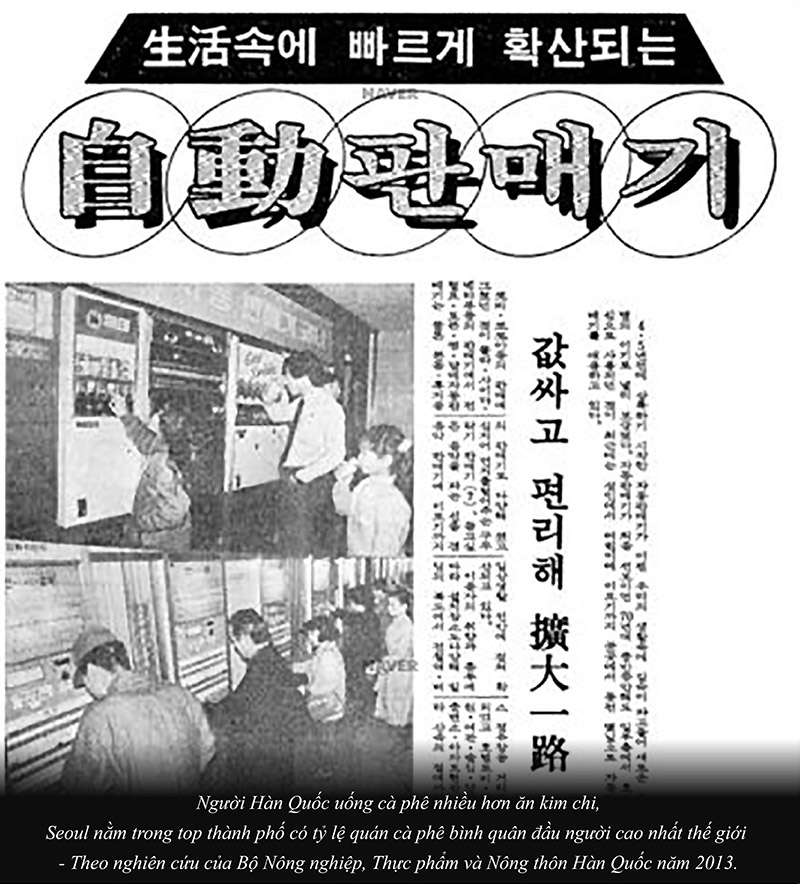
Koreans drank more coffee than ate kimchi, Seoul was in the top of cities with the highest rate of coffee shops per capita in the world – according to a study by the Ministry of Agriculture, Food and Rural Affairs of Korea in 2013.
In 1977, Lotte Industries introduced coffee vending machines in Korea. In just one year, more than 1,100 coffee vending machines were installed in major public places, corporate offices, library lounges, university campuses, etc. with the record of over 150,000 cups of coffee sold per day. Since then, Korea has become one of the fastest growing coffee consuming countries in the world.
Innovation and creativity are the driving forces behind Korea’s socio-economic development. Korean aspirations have really been awakened. At the end of the 20th century, Korea was one of the countries with the fastest economic growth in the history of the modern world. In the 1980s, two corporations Samsung and Hyundai were ranked in the list of 50 largest enterprises in the world. By the end of 1995, Korea was ranked as the 11th largest economy in the world, shedding its colonial image of poverty.
Changing perception is a prerequisite for changing the way we act. From a nation exhausted after the war, a nation without any other resources has achieved a feat with only a revolution in thinking and creative energy. Throughout the process of moving forward, coffee has always been the ideal drink to awaken creative aspirations, making a fundamental contribution to the creation of self-reliance, for each individual to embark on the miraculous cause of changing the destiny of the nation.
Chung Ju-yung, founder of Hyundai Group, author of the autobiography “No Failures But Trials” affirmed that “The Korean economy’s development today is based on the indomitable will of the creative people.” This is also one of the 100 precious books in the Life Changing Foundational Bookcase which the Founder – Chairman of Trung Nguyen Legend Group, Dang Le Nguyen Vu, has dedicatedly selected and gifted to tens of millions of young Vietnamese, inspiring the young generation with great aspirations, great intentions, starting a business to build a nation to create a powerful and influential Vietnam together.
THE REAL COFFEE
ROASTED ONLY FOR PEOPLE OF WISDOM!
Source: “The Philosophical Way of Coffee” – copyright by Trung Nguyen Legend


